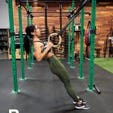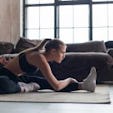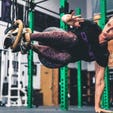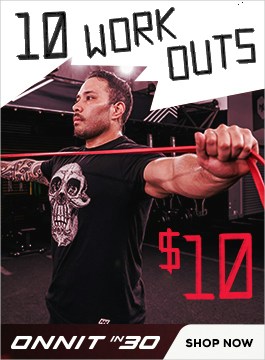Your heart is pounding in your chest as your fingers grip the ledge. Sweat pours down your face and your muscles start to tremble.
You don’t dare move, but you can’t hold on much longer. All you hear are footsteps and your heart beating like a drum from deep inside your heaving chest. You close your eyes and think. “Cardio, I need more cardio.” That was rule #1 in the movie “Zombieland,” how could you forget to training your cardio? Well, it’s too late now cream-puff. You are running for your life and that step class you dropped out of can’t help you now. Your weak cardio and under trained legs aren’t going to get you out of this mess. If you could go back in time and train like an athlete instead of an underwear model.
Before you find yourself perched on the edge of oblivion, you had better get fit, Really fit. The expression is “survival of the fittest,” not “survival of the cutest,” If you want to be ready for anything you have to train to be ready for anything, “Are you as fit as you look?” Mike Diamond, one of my top students in the USA, is fond of asking new clients this question. You may look like a fitness model, but is that shell of a body built for show or built for go?
Are you ready to survive everything from a natural disaster to a zombie apocalypse; or are you going to be the first course in a zombie buffet? Don’t panic. I am going to help you develop five essential survival attributes that will get your butt into gear and off the post apocalypse menu. Add these practices to your training and you will go from all show to ready to go.
Fitness Attribute #1: Breath Holding
Most of us only think about our breathing when we are losing it. Keeping your “wind” in grappling, running, or endurance lifting such as Kettlebell Sport is about more than just capacity, it’s about control. Being able to relax and control your breath is an essential survival attribute for running, lifting, and hiding un- derwater to shake your mother-in-law off your tail.
One of the best ways to develop breath control was developed by yogis and is known as Pranayama. Yoga breathing techniques are practiced as a means of moving prana (energy) throughout the body. These same techniques will help you develop control and increased capacity in breath retention. There are many forms of Panayamic practice. The following is a simple beginner routine you can follow.
Sitting or kneeling in a comfortable position with a straight back, begin to control your breathing by inhaling for a specific count and immediately exhaling for the same count. You may count in your head or make use of a metronome to keep a constant beat.
For example, inhale for a slow count of eight and exhale for the same count. Breathing is done through the nose with the mouth closed. After a dozen breaths in and out, begin to experiment with breath retention. Inhale for a count of eight then lower your head and hold foran eight count. Slowly release the breath for a count of eight bringing your head and neck back to a neutral position, and then hold for an eight count after your exhale. Again, you can slightly lower your head during the hold of the exhale. Begin this practice with a dozen repetitions. You should be relaxed during all of your breathing, including the holds. If you feel like you are straining, reduce the count. As it becomes easier increase your count and repetitions.
Fitness Attribute #2: Balance Drills
 Balance is good. It keeps us on our feet and separates us from the really drunk people at a party. Staying on your feet while running and landing takes practice and kinesthetic awareness. There are many fun ways to improve your balance, and while many will argue that tools such as Indo Boards only improve specific balance for that specific product, the pure joy of train- ing on such tools is a great way to begin adding balance work to your routines.
Balance is good. It keeps us on our feet and separates us from the really drunk people at a party. Staying on your feet while running and landing takes practice and kinesthetic awareness. There are many fun ways to improve your balance, and while many will argue that tools such as Indo Boards only improve specific balance for that specific product, the pure joy of train- ing on such tools is a great way to begin adding balance work to your routines.
Try warmingup for your next routine with a short balance session with an Indo board. It’s a fun way to loosen up and to experiment with balance work. Get back to movement basics with some primal climbing and obstacle work with a park bench walk. Walking on the back support of a park bench is a great way to work balance and kinesthetic awareness. Use “play as the way,” and develop greater balance in your training.
Fitness Attribute #3: Deadlifting Strength
The deadlift is one of the most primal barbell exercises you can do. It is the king of barbell maximal strength training. There is nothing like reaching down and grabbing a heavy bar and feeling gravity lose its grip as you drive the weight up. This kind of full- body strength should be a part of everyone’s survival training regime. Deadlift strength will help you lift boulders off of your bud- dies, pull cars off of screaming, slow-moving yuppies, and flip gigantic tires in front of hot women at the gym. All of these useful skills can be yours if you add deadlifts to your training.
Fitness Attribute #4: Bent Arm Hangs
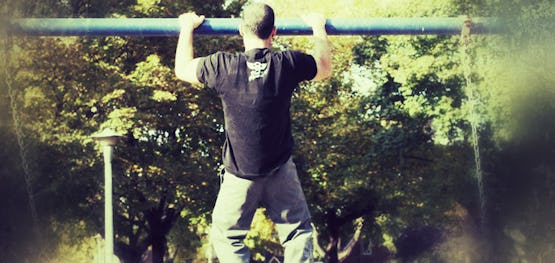 Preacher curls and undersized t-shirts may make your arms look big, but you need more than bulk to save your skin when you are hang- ing for your life. If you want to develop a grip that can be used for more than just holding beer cans and Twinkies, you need to work your bent arm hangs. Hit a local park and work on static bent arm holds. Find something to hang on and shuffle from one side to the other. If you are feeling lucky with this, try removing one hand; this will help you develop great bent arm strength.
Preacher curls and undersized t-shirts may make your arms look big, but you need more than bulk to save your skin when you are hang- ing for your life. If you want to develop a grip that can be used for more than just holding beer cans and Twinkies, you need to work your bent arm hangs. Hit a local park and work on static bent arm holds. Find something to hang on and shuffle from one side to the other. If you are feeling lucky with this, try removing one hand; this will help you develop great bent arm strength.
Fitness Attribute #5: Hill Sprints
I once heard a man say, “you can’t flex cardio” in response to why he doesn’t train endurance. Well meat heads, it’s true you can’t “flex” cardio. It is also true that in nature, the slow winded get eaten first. If endurance isn’t on your training menu, then one day you will be on someone or something’s. Build
up an iron will and lungs to match with hill sprints.
Step 1: Find a hill.
Step 2: Run up the hill.
Step 3: Repeat step two until you can out run every animal or zombie in your area.
Survival of the “Fittest”
One day while finishing a workout with hill sprints, someone called over to me and asked what I was training for. I looked over and responded “life.” I train to live better and lon- ger. That means doing activities that improve the quality of my health and make me more resistant to failure. You don’t have to think the world is coming to an end, or that a zombie apocalypse is eminent to start incorporating survival fitness training into your workouts.
Plan every training program for more than simply improving your strength, flexibility and endurance, plan for a foundation of improving your “movement.” Learn to move better and you will live better. I created my training system based on the simple idea: we should learn to control our bodies first, and then we can learn to overcome external resistance. That control comes in a wide variety of forms, from breathing to squatting to running to bal- ancing, it’s all part of the same process. Learn to master yourself and you learn to master life.
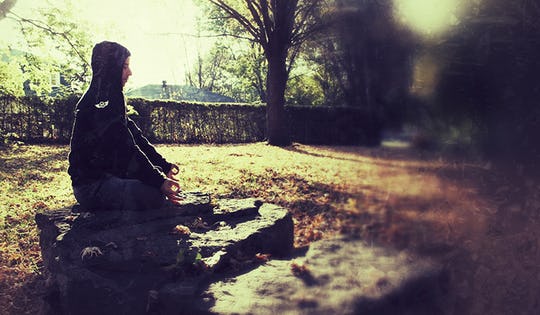
)
